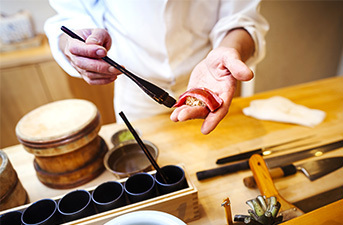Restaurants(3860)
Sushi Yon HANA
Perfection might not exist, but this A-list sushi joint's signature, flower-shaped sushi with sea urchin and gold flecks comes remarkably close.
Yakiniku Aoyama Gaien
A chic yakiniku spot in Aoyama, Yakiniku Aoyama Gaien specializes in serving premium Japanese Black wagyu with no frills — just expertly prepared meat that truly "satisfies the soul."
Aoyama Gyusai
With house-made sauces, counter-grilled wagyu and a love for Ibaraki-grown Hitachi beef, Aoyama Gyusai expands the definition of high-caliber teppanyaki dining in Aoyama.
IL PINOLO Ginza
There’s no trick or “modern takes” at this Ginza ristorante — just the deep and thorough love for Italian cuisine from executive chef Watanabe Tomotaka, who works on a mantra of great ingredients, simply cooked.
Ryuduki Teppan
By Kinshicho Station, sip wine and indulge in melt-in-your-mouth regional wagyu teppanyaki in this evening-only restaurant whose decor mirrors the tale that inspires its name: the mythical dragon.
「REGINA」
A strong contender among the city’s crop of contemporary Italian joints, 「REGINA」in Kinshicho is making the night, as it should be, all about women.
SUSHI RYUDUKI
An intimate 12-seat omakase bar where champagne reigns with sushi — park yourself at the hinoki cypress counter for a multicourse meal featuring day-fresh fish from the market.
Aquarium Dining Ryuduki
This Kinshicho restaurant has some serious good looks and seriously good food. Thanks to the backing of its high-grade sister stores, it’s offering a unique trio of Italian, teppanyaki and sushi.
Kani Kani Land Kyoto Gion
Originally from Niigata, this restaurant brings the famed snow crab and king crab from off the Sea of Japan's frigid waters to the historic geisha district of Gion in Kyoto.
OBENKEI Kyoto Gion
This beloved Niigata-based sushi restaurant has found a new home in Kyoto’s iconic Gion district, carrying forward its deep-rooted passion for all things Sado Island to a broader audience.
Sushi Rei
Sushi meets art in this suave sushi omakase venue in Omotesando, helmed by a young chef delivers Edomae-leaning dishes served in handmade lacquerware by local artists.
Azabu Saotome
After a decade of holding a Michelin star at Hong Kong's Kaiseki Den, master chef Saotome Hiroyuki’s omakase-only debut in Nishi Azabu has brought fresh energy and focus to traditional Japanese cuisine.
Sushi Umiji
Expanding on the Edomae concept, Sushi Umiji introduces Tokyoites to a new wave of luxury-meets-classic sushi, merging ingredients like caviar, foie gras and sea urchin without restraint or a hefty price tag.
Sukiyaki Harijyu Dotonbori
Situated in the middle of Osaka’s Dotonbori entertainment district, this sukiyaki restaurant has been serving customers with high-quality wagyu beef hotpot for over 100 years.
Minokichi Takeshigero Hotel Granvia Kyoto
The Hotel Granvia Kyoto plays host to one of Kyoto’s most historic kyo-kaiseki restaurants, with over 300 years of history serving freshwater fish and other traditional dishes.
Sushi Kimura Nihombashi
One city’s loss is another’s gain. Following a 15-year stint at one of New York City’s most exclusive sushi restaurants, Kimura Koji arrives in Nihonbashi with an Edomae omakase concept shaped by fish from his hometown in Hachinohe.
Beef Nagayoshi
Opened in 2014 in Shinjuku’s Arakicho, Beef Nagayoshi serves an approachable A5-grade wagyu omakase course, with the owner handling all the grilling and dining is done at izakaya-style counter seating.
Sushi Aoyagi
Local legend Sushi Aoyogi debuted following The Tokyo Station Hotel’s renovation, serving technique-driven, quality-focused Edomae omakase to both the city's old and new crowds just steps from Tokyo Station’s historic red-bricked structure.
Tsukiji Jisaku
Step back in time at Tsukiji Jisaku and relax in a historic setting with a serene garden. Savor fresh, seasonal flavors with kaiseki courses and signature mizutaki hotpot, a generations-old recipe passed down by a single chef.
Hokkai Shabu Shabu Ginza
The “taste of the north country” is well and alive at this shabu-shabu hotpot specialist, flown down from Hokkaido into Ginza. Tuck into their signature thin-sliced lamb, highly marbled Hokkaido-raised kuroge wagyu beef and plump snow crab legs.
Hokkai Shabu Shabu Susukino
Visit the place where Hokkaido lamb hotpot first began. For over 50 years, Hokkai Shabu Shabu’s original Susukino branch has been serving up New Zealand lamb shabu-shabu style, exemplifying the “taste of the north country”.
Hakushika Classics
Aiming to bring back a long-forgotten definition of “luxury”, Nishinomiya sake specialist Hakushika Classics creates an opulent, traditional atmosphere in which guests can enjoy quality ingredients and sake both, beneath a curtain of flowers.
Kitashinchi Harami Shin-Omiya
This Nara specialty restaurant spreads the gospel of the harami. Japanese kuroge wagyu black beef skirt steak is presented in a number of increasingly luxurious ways, incorporating premium ingredients like truffles and caviar.
Wagyu Yakiniku Mikoto
With every seat in a private room, Kawagoe yakiniku specialist Mikoto is the ideal place to celebrate special occasions. Local wagyu beef is selected down to the finest detail, from marbling to thickness to the way the knife enters each slice.
Yakiniku Hatagaya
Drink, chat, and savor premium yakiniku at this bistro-esque venue close to Shibuya. From craft beer to crafted dining experiences, Yakiniku Hatagaya delivers.
Gumbo & Oyster Bar - Namba Parks Store
This Namba Parks oyster specialist is every oyster enthusiast’s dream. Sample oysters from all over Japan prepared in a number of different ways, and cleaned using a patented “five-star” cleaning process using deep sea water.
Emit Fishbar
This Ginza Six oyster specialist is every oyster enthusiast’s dream. Sample oysters from all over Japan prepared in a number of different ways, and cleaned using Emit’s patented “five-star” cleaning process using deep sea water from Toyama Bay.
ocean good table Ishigaki
Discover a lesser-known side of Okinawan cuisine at this Ishigaki restaurant, offering barbecued delicacies like highly-marbled Ishigaki wagyu beef and Agu pork — the latter so rare that it is colloquially called the “phantom pig”.
